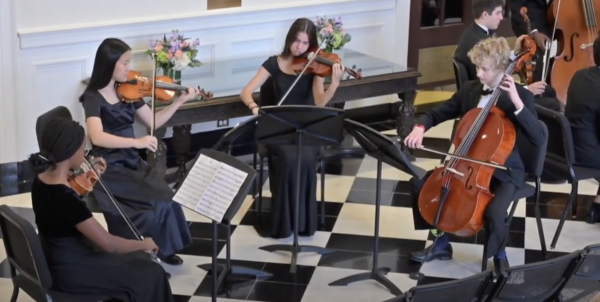The 39 Steps revitalizes Hitchcock classic on Kellett stage
The classic movies of director Alfred Hitchcock epitomize thrilling suspense and violent, twisting plots. On the nights of Nov. 15 and 16, the school will bring one of Hitchcock’s films, The 39 Steps, to the stage in a hilarious performance filled with spies, murder, and intrigue.
Directors Maggie Blake and Bryan Mercer, along with their cast of 20 students, have been working to create a hysterical production that appreciates Hitchcock but also sees the humor in it.
“The play loves Hitchcock and enjoys that spy noir romance,” said Blake, “but it’s also a send-up in the sense that it mocks it a little bit.”
The play turns many of the film’s serious moments into overly dramatic scenes that will leave the crowd roaring with laughter.
“There is sort of an acknowledgment that the audience is there,” said Blake, “and there is also an acknowledgment of how ridiculous these plots are.”
This willingness to make fun of itself, coupled with an admittance of the audience’s presence, make for a production unlike any other ever performed in Kellett Theatre.
Bryan Mercer, serving as co-director with Blake, notes the jumbled up humor of The 39 Steps. “It seems chaotic,” said Mercer, “but it has to be very, very rehearsed.”
For the directors, orchestrating The 39 Steps has proved to be quite a difficult task. The school has modified the original play to give more actors an opportunity to perform, which makes for an interesting challenge.
“The gimmick traditionally has been to use four people doing 40 roles,” said Mercer, “but in this situation, when schools do it, they open the roles up to give as many kids as possible a role.”
But with more people come more modifications to the original play and more moving parts to orchestrate. And that’s only the tip of the iceberg. The plot of The 39 Steps is laden with staging challenges.
“We have a point where there are two pilots who crash a plane,” said Blake. “We don’t have a plane!”
The insanity of the play leaves a significant amount of room for the audience to visualize what they think happens. “Uniquely, the play leaves a lot to the imagination of the audience.” said senior Margaret Kuester. “Each person has the opportunity to see it their own way.”
The 39 Steps is a unique challenge for the actors as well. They are responsible for mastering four accents: Scottish, Cockney, upper-class British, and Canadian. Aditionally, the style of the play is unlike anything most have ever encountered in their acting careers.
“It’s got that film noir, 30s and 40s, black-and-white kind of elegance. The language is smart and snappy,” said Mercer. “And it’s the kind of style that high schoolers don’t get to do very often. It’s not usually understood by people so young, and yet we have a cast that seems to get it.” The 39 Steps’ acknowledgement of the audience’s presence is another unconventional aspect. This feature opens the door to hilarity and silliness.
“The humor centers around breaking down the fourth wall- addressing the audience’s presence and making the play look unplanned and spontaneous,” said Kuester. “The chaos adds a lot to the humor.” Despite the abundance of goofy, dramatic fun, Hitchcock’s serious plot remains; the film is a canvas for all of the theatrical insanity and chaos.
“I think that it’s narratively satisfying,” said Blake,” because it does have a plot in the sense that there is a bad guy and there are murders and there are beautiful women falling for a handsome guy.” The directors do not see the low production values of The 39 Steps as detrimental to the overall viewing experience.
“This is a story told well and on the kind of low budget end which I prefer,” said Mercer. “It takes more creativity, it takes more imagination. And I think, when you go to the theater, we need to supply an audience with a little bit more room to move in the brain and not just feed everything with glitter and flashing lights.”
The talented cast is another selling point of The 39 Steps. “Alex Floyd never leaves the stage,” said Kuester, “which is reason enough for any sane person to come every night.”



